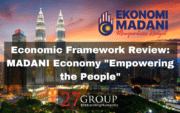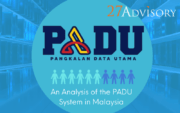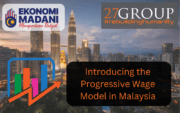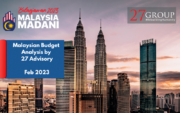The client is a Ministry in Malaysia, with primary function to formulate, implement and monitor medium and long-term socio-economic development nationwide. In view of the emerging 4th Industrial Revolution and its impact towards various economic sectors, the Client is envisioned to commission a study – to develop a national policy framework that would guide the 4IR related policy development and implementation to be adopted by all government ministries and agencies.
FULL STORY
The 11th Malaysian Plan (RMK11) that was released by the Malaysian Government, highlighted “Harnessing the 4th Industrial Revolution (4IR)” as one of the strategies to promote innovation, creativity, and competitiveness of all sector in embracing the intensification of digital revolution. Following this, the Ministry of International Trade and Industry (MITI) has launched the National Industry 4.0 Policy Framework (Industry4WRD) in 2018, on the adoption of Industry 4.0 technology elements for the manufacturing sector and manufacturing-related services.
Given this, there is a need to develop a broader 4IR policy framework for the rest of the economy to interphase with the Industry4WRD framework. In addition, a multitude of current policies that direct sectoral growth must be reconciled within a wider structure for improved resource optimization and alignment of execution.
It is with these circumstances we were engaged by the Client with another international consultancy firm to devise the national policy framework. Our tasks were mainly on the international benchmarking on policy strategy with key enablers, such as technology standards, regulations, financing, human capital and infrastructure. This justifies the establishment of the 4IR technology, the development of policy objectives and programmes with specific KPIs, and the governance framework for successful execution and monitoring.
KEY OUTCOMES
The team begun with a detailed policy review against the current 4IR or tech-related policy in the country. This includes more than twenty policy documents at national and sectoral level. The assessment provided an initial gap analysis that showed the critical policy gaps that needed to be addressed.
This was followed by an international benchmarking on various developed and emerging countries around the world, focusing on those countries that are known as champions in digital and technology segments, and our peer countries in South East Asia. The benchmarking evaluated a major policy framework – policy and initiatives that are related to industrial revolution and technology development. Then the team conducted a detailed comparative analysis to identify the key success factors that served as the guiding principles for these countries. The result is an initiative map with more than 100 key initiatives that are commonly seen in these benchmarked countries.

While this is on-going, another workstream was concurrently looking at the digital readiness of public sector and various economic sectors in Malaysia. This assessment was to provide an indication of the digital maturity level of government departments and various industry sectors, as well as their readiness to embrace 4th Industrial Revolution. Upon the completion of this assessment, we had a much clearer idea on the sentiment and readiness of both public and private sector towards the adoption of digital technologies in their operation and business, as well as the assistances and intervention needed to expedite the adoption progress.
Another critical aspect in devising the policy framework is the syndication with relevant stakeholders. A policy framework at this scale will require the concerted effort and seamless collaboration from different ministries, agencies, as well as key industry groups. A series of workshops and focus groups discussions were carried out to understand the on-ground challenges faced by the industries during the 4IR and digital transformation process, as well as the possible interventions required by the government.
The final phase of the project was the ideation and refinement of the 4IR policy framework, policy strategies, key initiatives and its associated action plans. A new governance structure was proposed to ensure effective performance monitoring, issues rectification and on-going improvement with clear and achievable KPIs. Various short-term and long-term programmes and initiatives were proposed and syndicated with the key implementing parties to ensure the outcomes are in line with the desired results by public and private stakeholders. By the end of the project, we prepared a time-phased policy implementation plan that would guide the client through the policy drafting and implementation process.












